Baku. 5 November. REPORT.AZ/ Report News Agency presents an interview with the Moroccan Kingdom Ambassaor to Azerbaijan, Hassan Hami:
- Mr. Ambassador how do you assess bilateral ties between our countries? In which areas do you see the perspectives to deepen this cooperation?
- The bilateral relations between Morocco and Azerbaijan are excellent. We have never suffered any misunderstanding. The relationships between His Majesty, King Mohammed VI and His Excellency President Ilham Aliyev are friendly and are being strengthened by the brotherly bonds of mutual respect and appreciation between the two people. This is paving the way for more achievements in a variety of domains.
- Are you satisfied with the level of economic cooperation between our countries? What's the level of trade turnover?
- I am afraid to say that the trade volume between the two countries does not reflect the level of the excellence of the political and diplomatic bilateral relations. Nevertheless, the two Governments are working on prospecting means and ways to boost economic partnership and trade exchange. There are a lot of opportunities within the two countries for Moroccan and Azeri businessmen. The signing of the finalized agreements either on bilateral singled level or on the level of the Joint bilateral Committee will provide the business community with a clear vision and a legal basis for boosting the economic and business relations. I remain very optimistic about the future of the economic and trade relationships between Morocco andAzerbaijan. Energy, agriculture, industry, and tourism could be good fields for both countries to strengthen their ties of cooperation. I see a lot of opportunities that might benefit for Azerbaijan. Indeed Morocco has a very liberal investment code. Morocco has signed several free trade agreements, with United States, the European Union, Turkey and other Arab countries etc. Negotiations are being held with Canada and Chili. So, it would be a good opportunity to Azerbaijani business community to invest in Morocco. I will not forget to tell you that the Moroccan business community is interested in the Azeri market and a meeting was planned late June, but has been postponed due to the First European games held in Baku. We are still working on the this project.
- What can you say about tourism potential between our countries? How many Azerbaijani tourists visited Morocco last year? Are there any plans to launch air flights between our countries?
- Two Agreements on tourism and culture had been signed in 2008. The two countries are exploring ways and means to boost cultural and tourism exchange. Morocco Days were organized in Azerbaijan in 2009 and 2011. Azerbaijani Days were organized in Morocco in 2007 and 2012. Morocco participated in International Tourism Fair in Baku in 2013 and 2014. Tourism industry is a long haul process. It takes time. The dividends are brought about over years if not decades. So, people have to learn to be patient. We expect things to be on the right truck. And, again we have to know how to achieve our objectives by doing things right. Morocco inaugurated a new strategy program called “2020 Vision” on November 2010, which aims at doubling the number of foreign tourists and tripling the number of the local tourists. The programs will involve six fully integrated projects to diversify the investments and boost the regionalization policy undertaken by the government. Morocco will be interested not only in investing in Azerbaijan when time comes, but also in receiving Azeri investments in tourism sector in Morocco. So far, a few thousands of Azerbaijani tourists visited Morocco. A few tour operators are cooperating to make Morocco and Azerbaijan a potential destination, mainly during Novruz, and Summer Holidays. Azerbaijani tourists prefer the package offers, so they could visit France, Spain, Portugal and Morocco at the same time.
As for air flights, for the time being, there is no direct flight between Morocco and Azerbaijan. The best routs used up till now is Casablanca-Istanbul-Baku. Moroccan Airlines, Royal Air Maroc and Turkish Airlines have a code-share flights agreement. This might be used to promote charter flights. Azal would be a good partner within such kind of potential project.
- How does your country maintain security noting activity of ISIS and Al-Qaeda in Maghreb countries?
- Morocco has proven that it is a safe country. However, given the increasing terrorist threats in the world, mainly in neighboring countries, Morocco has to double vigilance and implement security measures in full respect of the freedom of circulation and human rights. Morocco policy toward fighting terrorism has been hailed by its partners and the international community alike. Besides being vigilant, Morocco spares no means to improve education and awareness among young populations that extremism is a danger for the whole community and that it jeopardizes the very essence of their existence. Nevertheless, fighting terrorism and organized crime networks require regional and international cooperation. All countries, mainly Morocco’s neighbors are urged to be involved so efforts in fighting terrorism will be deployed to improve education, welfare and prosperity of their people.
It is feared that the status quo with respect to bilateral and regional conflicts will weaken the existing states and turn them to be phantom or failed states. Those who are nurturing old schemes of jeopardizing the sovereignty and the territorial integrity of existing states are wrong and are requested to think twice, because they are not immune from sipping the same liquor.
With respect to people and organizations that claim to have the best understanding of Islam, Morocco model based on the institution of “the Commander of the Faithful” provides for a moderate Islam. In this respect, last June Morocco inaugurated the Mohammed VI Foundation for African Ulema with the aim of sharing its experience in the field of peaceful Islam based on tolerance and moderation. So, far countries like Mali, Senegal, Niger, Ivory Coast, Guinea Conakry and even France have dispatched (or in process of doing so) their Imams, preachers, religious scholars to learn from Morocco’s experience. And the door is open even for other Muslim countries, including a secular country like Azerbaijan.
- In November 6, Morocco celebrates Green March anniversary, which showed the will of Moroccan people to make Spanish forces withdraw from Southern provinces. Can you say something about these demonstrations in 1975? What steps are taken in order resolve the problem of the status of these lands?
- I am glad you are asking this question. Morocco is celebrating the 40th anniversary of recovering its Southern Provinces on November 6th 2015. Indeed in 1975 Morocco organized a peaceful march, well-known now as the Green March to force Spain to end its occupation of this part of Moroccan territory. Nevertheless, it is worth reminding that in the first three decades of the last century, Morocco had been subject to French and Spanish Protectorate regimes, while the city of Tangiers had been under a special international status. Thus Morocco had to negotiate its independence with both France and Spain starting from 1955, and getting its sovereignty back step by step. Therefore, since the independence, the main issue was to build up a strong state, diversify the foreign policy and develop the country. Morocco opted for an opened political system that has been evolving since then, taken into account different internal and external challenges to be met, accordingly.
As for the Moroccan Southern Saharan Provinces, Morocco has proposed an Autonomy Plan that would ensure a large autonomy within the sovereignty and the territorial integrity of the country. It is a good proposition that is being hailed by the international community as sound and credible. Unfortunately the other parties involved are obstructing the process of negotiation by resorting to arguments rooted in the cold War practices. Morocco is committed to go ahead with its development programs in its Southern Provinces that have been implemented since 1976. Morocco has entered in new phase of the development not only its Southern Provinces, but also in the other regions within the framework of an advanced regionalization system, which is another step towards more local and regional democracy enhancing populations’ participation in the decision making process. Last September, Local and Regional elections were organized. According the Constitution adopted in 2011, regions will be the levier of the development and to the local and regional democracy. Twelve regions (12) are set up and they have already elected their Presidents and board members. The Sothern Provinces have elected their Presidents too. They are requested by people who elected them to implement social and economic programs and work together with the private sector to improve the living conditions of the people.
It is worth noting that since Morocco has recovered the South Provinces and specifically since 1976, more than twenty billions MAD have been invested. Indeed when Spain withdrew, Morocco had been faced with lack of infrastructures. Morocco had to start everything from scratch in infrastructures, schools, hospitals etc. Furthermore the Moroccan Agency for the Promotion of Economic and Social Development of the Southern Provinces has been created with the aim of coordinating projects dedicated to this region. All funds were (and still are) provides by the national public budget. Nevertheless, lately, the private sector has been involved with investments estimated at millions of dollars.
In so doing, Morocco shows its good faith and commitment to get the Southern Provinces enjoy the same level of development as the whole regions of the country. This is deeply rooted in the Moroccan people long-standing tradition to join forces and nurture commitment to assist each others in good faith. Unfortunately, while Morocco thought that its rights were back, some countries, within the framework of the Cold War, made their prime foreign policy goals to give hard time to Morocco.
No matter what, Morocco will keep on implementing its policy towards making the whole country from Tangier, in the north to Laguira, in the south a land for promises, welfare and commitment to peace and security. By celebrating the 40th anniversary of the recovery of the Southern Provinces, Moroccan people will demonstrate how this land is so dear to their hearts. Sacrifices have been made, and now, the Southern Provinces are enjoying the development and the progress they really deserve. The advanced regionalization is being implemented to promote not only the Saharan provinces but the whole newly created twelve regions.
- We know that Morocco has tensions with Spain over some disputed lands. Can we expect resolve of this issue?
- Indeed, two cities in North of Morocco, Ceuta and Melilla and the Zafarine Islands are still under Spanish colonization. Morocco is willing to solve this issue through negotiations. His Majesty late King Hassan II had proposed to the Government of Spain to set up a joint committee with the task to sort out the best way to resolve peacefully this issue. The leaders in both countries have proven so far that they could handle problems pertaining to the two cities in good faith and promising hope in the future.
- What's the position of Moroccan government regarding Nagorno-Karabakh issue?
- Morocco supports the principle of territorial integrity of States. Morocco has always called for the settlement of the Nagorno-Karabakh conflict by peaceful means. Morocco supports all efforts in that direction and hopes that negotiations could bear their fruit and achieves real results.
As you know, Morocco and Azerbaijan support each other on the issue of their territorial integrity and sovereignty. We believe that the solution pertaining to the Saharan Southern Provinces of Morocco and to Nagorno-Karabakh is to be reached within this framework. Negotiations should continue, and hopefully the other parties will understand that peace is better than a lasting instability. It would be a disaster if they continued to support the fragmentation of sovereign states or promoting the creation of artificial and phantom entities for the sake of playing leadership games or hiding their own internal problems they could not solve.
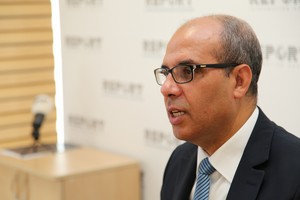
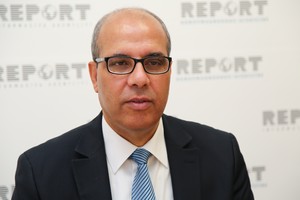
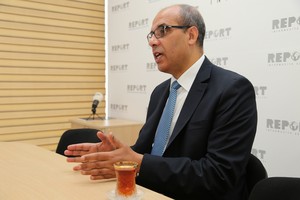
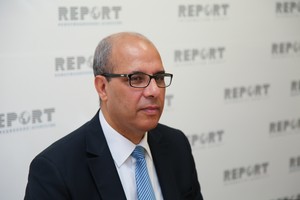


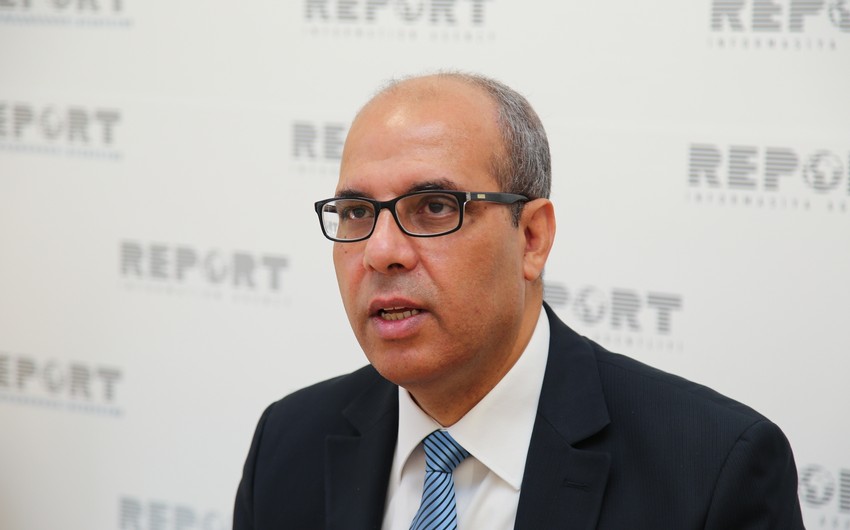 https://static.report.az/photo/a79091ee-78c2-4acb-9a47-d083a91ea2bc.jpg
https://static.report.az/photo/a79091ee-78c2-4acb-9a47-d083a91ea2bc.jpg

